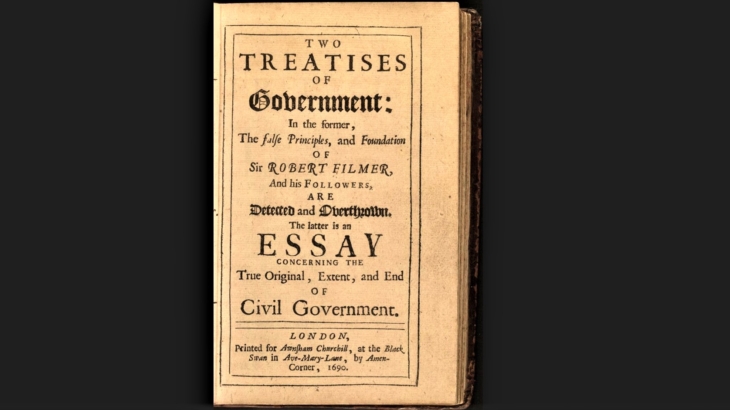A Founding Built Against Unbridled Power: Principle of Civic Duty to Rein In Overreaching Government

Essay Read By Constituting America Founder, Actress Janine Turner
“They tell us, sir, that we are weak; unable to cope with so formidable an adversary. But when shall we be stronger? Will it be the next week, or the next year? Will it be when we are totally disarmed, and when a British guard shall be stationed in every house?” – Patrick Henry, in a speech delivered at St. Johns Church, Richmond, Virginia, March 23, 1775
When and how should citizens confront abuses of power by their government?
This is a fundamental question that has shaped political discourse for centuries.
Patrick Henry, and the other colonial leaders who galvanized opposition to the predations of George III, drew upon English legal precedents and Enlightenment philosophy. They built their rebellion against tyrannical overreach on foundations laid by their English ancestors.
There has always been conflict between those who desire unbridled power and those they govern. Often this conflict was settled through force of arms. On June 15, 1215, it was settled by force of law.
Rebelling English nobles forced King John to sign a “Great Charter of Freedoms,” now known as the Magna Carta. The Charter became the basis for English Common Law and the laws of most English-speaking nations, particularly the United States.
While the Magna Carta focused on individual rights and the legal system (such as trial by jury), Clause 61 empowered citizens to rein in overreaching government. It created a Council of 25 barons to monitor and enforce King John’s compliance with the Magna Carta. This included controlling feudal payments to the Crown, and by implication how the Crown spent “public” funds and governed. Clause 61 included real sanctions: If John did not comply with the provisions of the Magna Carta, “the 25 barons were empowered to seize the King’s castles and lands until, in their judgement, amends had been made.”
King John colluded with the Pope to undermine the Magna Carta, but his successors reissued it and it became a formal part of English law.
During the 13th through 15th centuries, Magna Carta was reconfirmed at least 32 times. The first item of parliamentary business was a public reading and reaffirmation of the Magna Carta.
The Stuart line of kings challenged the four-hundred-year Magna Carta balance of power to their peril. King Charles I asserted he would not be reined in by Parliament. This led to civil war and his beheading in 1649. During the post-Civil War Restoration, Charles II adopted a more passive approach to governing. However, James II ignored his elder brother’s compliance with Parliamentary restrictions which led to his being overthrown during the “Glorious Revolution” of 1688.
Parliamentary ascendancy, and ultimate permanent dominance under a “Constitutional Monarchy,” was buttressed by philosophical publications. These writings gave broader context to how power must be reined in and how it should be done under law.
In 1680, Henry Care published English Liberties. It established individual rights as bestowed at birth, not by government. Care formally asserts,
“each man having a fixed Fundamental Right born with him as to the Freedom of his Person and Property in his Estate, which he cannot be deprived of, but either by his consent, or some Crime for which the Law has Imposed such a Penalty as Forfeiture.”
He describes the balance of a reined-in government, “qualified Monarchy, where the King is vested with prerogatives sufficient to support Majesty; and restrained from power of doing himself and his people harm.”
Care supported his philosophical doctrine with a compendium of foundational political documents. He made the Magna Carta central to history and to the contemporary legitimacy of individual freedom and control of government overreach. English Liberties became very popular in British reform (Whig) circles and widely read among leaders in the American colonies.
Even more popular among colonial thinkers and activists was John Locke’s Two Treatises of Government published in 1689.
Locke’s Second Treatise describes the importance of a civilized society based on natural, God given, rights. It supports the social contract theory of the governed consenting to limited government in exchange for a secure and stable environment in which individual activity and commerce can thrive. It became the primary conceptual work defining traditional 18th and 19th Century Liberalism.
Locke’s Second Treatise was frequently cited in Colonial debates about George III’s taxes and other punitive measures that comprised the King’s overreach and over reaction to colonial freedom.
Locke describes the balance of power between an executive (or monarchy) which is a “Power always in being that must perpetually execute the law” and the legislature which is the “supreme power of the Common wealth…governments are charged by the consent of the individual, i.e. the consent of the majority, giving it either by themselves, or their representatives chosen by them.”
Locke promotes the proposition that a full economic system could exist within the “state of nature.” Property predates the existence of government. Society should be dedicated to the protection of property. He expanded on Care’s “social contract” theory and explains how the “consent of the governed” may be withdrawn when power is abused, thus serving to rein-in government overreach.
The philosophy of Two Treatises is echoed throughout the Declaration of Independence. Thomas Jefferson wrote: “Bacon, Locke, and Newton – I consider them as the three greatest men that have ever lived, without any exception, and as having laid the foundation of those superstructures which have been raised in the Physical & Moral sciences.”
The foundations of the Magna Carta, English Common Law, and the writings of Care and Locke birthed our nation. They guide and inspire citizen oversight and empowerment to this day.
 Scot Faulkner is Vice President of the George Washington Institute of Living Ethics at Shepherd University. He was the Chief Administrative Officer of the U.S. House of Representatives. Earlier, he served on the White House staff. Faulkner provides political commentary for ABC News Australia, Newsmax, and CitizenOversight. He earned a Master’s in Public Administration from American University, and a BA in Government & History from Lawrence University, with studies in comparative government at the London School of Economics and Georgetown University.
Scot Faulkner is Vice President of the George Washington Institute of Living Ethics at Shepherd University. He was the Chief Administrative Officer of the U.S. House of Representatives. Earlier, he served on the White House staff. Faulkner provides political commentary for ABC News Australia, Newsmax, and CitizenOversight. He earned a Master’s in Public Administration from American University, and a BA in Government & History from Lawrence University, with studies in comparative government at the London School of Economics and Georgetown University.
Click here for First Principles of the American Founding 90-Day Study Schedule.
Click here to receive our Daily 90-Day Study Essay emailed directly to your inbox.




Biblical principles and themes played an important role not only in the formation of our nation, but I’m traditions and customs to this very day.